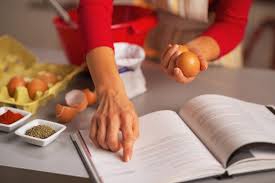Contents
ozeku.com – Cooking is a valuable skill that enhances your quality of life, allows for creativity, and promotes healthy eating. Whether you’re a complete beginner or looking to refine your culinary skills, learning how to cook can be a rewarding journey. Here’s a comprehensive guide to help you get started.
Read More: GreedFall: Memasuki Dunia Fantasi dengan Pilihan yang Membentuk Nasib
1. Understand the Basics
Start with Simple Recipes
Begin with straightforward recipes that require minimal ingredients and basic techniques. Dishes like scrambled eggs, pasta, and stir-fries are excellent starting points. These recipes help you familiarize yourself with fundamental cooking methods and build confidence.
Learn Cooking Terminology
Understanding common cooking terms is essential. Terms like sauté, simmer, and blanch describe various techniques and can be found in most recipes. Familiarize yourself with these terms to follow recipes more effectively.
Reaad More: Tips Bermain Warcraft: Menguasai Dunia Strategi dan Perang
2. Gather Essential Tools and Equipment
Basic Kitchen Tools
Invest in essential kitchen tools such as a sharp chef’s knife, cutting board, pots and pans, measuring cups and spoons, and mixing bowls. Having the right tools makes cooking more manageable and enjoyable.
Cookware and Utensils
Some additional items you might need include a spatula, wooden spoon, and tongs. A good-quality non-stick skillet and a heavy-bottomed pot can also be very useful.
Read More: Tips Bermain Mario Bros: Menaklukkan Dunia Mushroom Kingdom
3. Learn Cooking Techniques
Knife Skills
Proper knife skills are crucial for efficient and safe cooking. Practice techniques such as chopping, dicing, and julienning. Start with basic vegetables like onions, carrots, and bell peppers to build your skills.
Cooking Methods
Familiarize yourself with various cooking methods, including:
- Sautéing: Cooking food quickly in a small amount of oil over high heat.
- Boiling: Cooking food in boiling water.
- Roasting: Cooking food in an oven at high temperatures.
- Baking: Using dry heat to cook food in an oven.
- Grilling: Cooking food over direct heat.
4. Master Basic Recipes
Staple Dishes
Learn how to make staple dishes that form the foundation of many meals. These include:
- Pasta: Understand how to cook pasta to al dente and prepare simple sauces.
- Rice: Master the basics of cooking rice, whether by boiling or using a rice cooker.
- Soups and Stews: Learn to make basic soups and stews, which are versatile and forgiving.
Sauces and Dressings
Experiment with basic sauces and dressings. A simple tomato sauce, vinaigrette, or creamy dressing can elevate many dishes and add variety to your meals.
5. Explore Flavors and Ingredients
Spices and Herbs
Learn about different spices and herbs, and how they can enhance the flavor of your dishes. Start with commonly used spices like salt, pepper, garlic powder, and paprika. Experiment with fresh herbs like basil, cilantro, and rosemary.
Seasoning Techniques
Proper seasoning is key to delicious cooking. Taste your food as you cook and adjust seasoning as needed. Learning how to balance flavors, such as sweet, salty, sour, and bitter, is important for creating well-rounded dishes.
6. Practice and Experiment

Cook Regularly
The best way to improve your cooking skills is through practice. Cook regularly to build your confidence and proficiency. Try to cook a few times a week, experimenting with new recipes and techniques.
Read More: Tips Bermain Mario Bros: Menaklukkan Dunia Mushroom Kingdom
Experiment with Ingredients
Don’t be afraid to experiment with different ingredients. Substituting ingredients or trying new ones can lead to exciting discoveries and help you develop a personal cooking style.
7. Use Resources and Seek Inspiration
Cookbooks and Online Resources
Invest in a good cookbook or explore online resources for recipes and cooking tips. Websites, blogs, and YouTube channels offer a wealth of information and tutorials for all skill levels.
Cooking Classes and Workshops
Consider taking cooking classes or workshops to learn from professionals. Many local community centers, culinary schools, and online platforms offer classes that cover various cooking techniques and cuisines.
8. Embrace Mistakes and Learn from Them
Don’t Fear Failure
Mistakes are part of the learning process. If a dish doesn’t turn out as expected, analyze what went wrong and use it as a learning opportunity. Understanding what didn’t work will help you improve.
Adjust and Adapt
Be flexible and willing to adjust recipes based on what you have available or personal preferences. Cooking is an art as much as it is a science, and creativity plays a big role in developing your skills.
9. Plan and Prepare
Meal Planning
Plan your meals ahead of time to make cooking more efficient. Create a weekly meal plan and shopping list to ensure you have all the ingredients you need. This practice can also help you develop a balanced and varied diet.
Prep Ingredients
Prepping ingredients in advance can streamline your cooking process. Chop vegetables, measure out spices, or marinate proteins before you start cooking to save time.
10. Enjoy the Process
Have Fun
Cooking sh- ould be an enjoyable experience. Experiment with new recipes, challenge yourself with different cuisines, and have fun in the kitchen. Share your creations with family and friends to receive feedback and encouragement.
Celebrate Successes
Take pride in your culinary accomplishments, no matter how small. Each successful dish is a step forward in your cooking journey. Celebrate your progress and continue to strive for improvement.
Read More: Mengungkap Dunia Bounce: Panduan dan Tips untuk Menguasai Game Bounce
Conclusion
Learning to cook is a fulfilling and valuable skill that enhances your life in many ways. By starting with the basics, mastering essential techniques, and embracing experimentation, you’ll develop confidence and proficiency in the kitchen. Remember to use resources, seek inspiration, and, most importantly, enjoy the process. With time and practice, you’ll become a skilled cook capable of creating delicious and satisfying meals.




